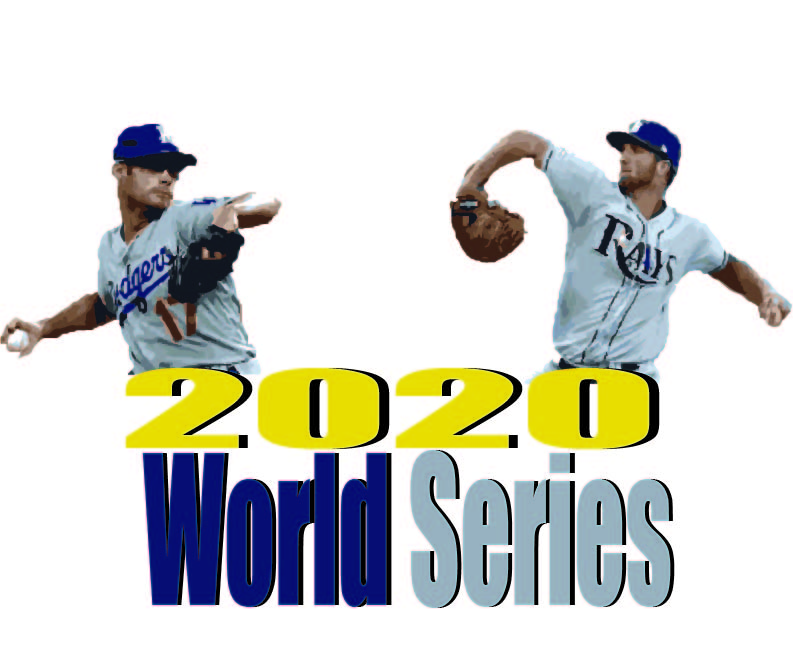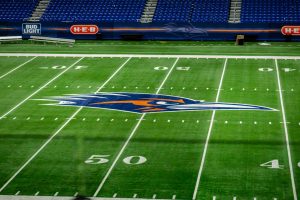A comprehensive guide to the Rays-Dodgers World Series
October 20, 2020
After perhaps the craziest, and certainly the strangest Major League Baseball (MLB) season ever, we have reached the finale, the World Series. With COVID-19 delaying the season from its usual late March/early April start date to late July, the MLB season needed major changes to finish by their target timeframe of late October. The season was dramatically shortened to 60 games, from its original size of 162, double headers were used liberally and consisted of two seven-inning games played back-to-back, extra innings would begin with a runner placed on 2nd base and sixteen teams would make the postseason instead of the usual ten.
The expanded postseason in particular raised red flags with a number of baseball fans. In order to accommodate the expanded number of teams, a best of three play in round was added that would see the 1st seed of each league play the 8th seed, the 2nd against the 7th, and so on. Baseball, in comparison to the other major sports leagues in America, lends itself to randomness. The chance of the worst team in baseball beating the best team in baseball on any given day is much more likely than any similar situation in other sports, so the idea of playing a best of three series in the first round had many people nervous that one of the better teams in baseball could suffer an unjust first round exit. In the end, however, after all the twists and turns of the strangest baseball season ever, we are down to a matchup between the two best teams in baseball during the regular season.
The Tampa Bay Rays are a surprising entrant in this year’s World Series. They entered the year in the shadow of the mighty New York Yankees, who after trading for all-star pitcher Gerrit Cole, were expected to waltz into the World Series. No one expected the Rays to win their division, let alone reach the World Series. Entering the year with a little under $76 million dollars in payroll, a far cry from the sums being paid out by the likes of the Dodgers and the Yankees, the Rays rode a strategy of being greater than the sum of their parts to success this year.
Possessing no true “superstar” on their roster, the Rays were able to provide a balanced attack throughout the year that provided just enough support for a strong pitching staff which compiled a 3.56 earned run average (ERA) over the regular season. Finishing with a record 40-20 on the year, including going a crucial 8-2 over their American League East rival Yankees, the Rays secured the 1st seed in the American League. On offense, the Rays did not have a true standout during the regular season, but second baseman Brandon Lowe enjoyed perhaps the best season of his young career, batting .269 with 14 home runs and 37 runs batted in, in just 56 games. The pitching staff was the real key to the Rays’ success, however, with a dominant bullpen especially proving pivotal to securing the 1st seed. Relievers Ryan Sheriff, Nick Anderson, Diego Castillo, John Curtiss, Andrew Kittredge, Aaron Loup, Pete Fairbanks and Chaz Roe all pitched with ERAs under 3.00 for the season, proving to be a lockdown bullpen if the Rays’ starters could get them the ball. Former American League Cy Young winner Blake Snell turned in a respectable regular season starting on the mound, going 4-2 in 11 appearances with a 3.24 ERA and striking out 11.34 batters per nine innings.
The Rays came into the postseason with confidence and quickly swept aside the 8th seed Toronto Blue Jays, dominating in two games. Awaiting them in the 2nd round were the rival Yankees. In a best of five series that went the distance, the Rays relied on their “any man on any given day” mentality. Backup 3rd baseman Mike Brosseau delivered the knockout punch in the decisive game five with a go-ahead solo home run over Yankees closer Aroldis Chapman after a 10-pitch battle to break a 1-1 tie in the 8th inning to send the Rays to the American League Championship Series (ALCS). Awaiting the Rays in the ALCS were the Houston Astros, baseball’s villains in the wake of the revelations around their use of a complex sign stealing scheme en route to their 2017 World Series championship. The Rays jumped out to a quick 3-0 series lead over the Astros, but the Astros were not ready to call it quits yet. Behind unbelievably clutch performances by their young and unproven starting pitching staff, the Astros managed to push the series to a decisive game seven. However, it was then that a former Astro, Charlie Morton, answered the call. Morton, gifted an early lead by the Rays offense, shut down the Astros offense, throwing 5 2/3rds scoreless innings and after the Rays’ bullpen survived a scare in the 8th inning, the Rays finally put away the Astros and advanced to their second World Series in franchise history.
The Rays pitching staff, just like in the regular season, has been instrumental to their success in the postseason. Compiling a 3.36 ERA as a staff, the Rays’ pitching has done an excellent job in keeping games close, something that they have needed throughout the postseason as they are only hitting .209 as a team. When the Rays do manage to get their bat on the ball, however, they make the most of it. The Rays currently lead all teams in the postseason, hitting 25 home runs in just 14 games. Leading the charge is the emergence of a true superstar in Tampa Bay, Randy Arozarena. The Cuban rookie was not on many baseball fans’ radar when the season began and only appeared in half of the Rays’ regular season games, but in the postseason he has come out of nowhere to make history. The outfielder is hitting .382 in the postseason and has crushed an MLB record seven home runs as a rookie in the postseason so far. Arozarena’s performance during the ALCS against the Astros, where he hit .300 for the series and blasted four home runs, including a 2-run shot in the first inning of game seven that gave the Rays a lead they would not relinquish, was phenomenal and it was little surprise to see him named the ALCS MVP.
The Los Angeles Dodgers exist as a complete opposite to the Tampa Bay Rays. Playing in one of America’s biggest markets, flush with cash and possessing stars up and down their roster, the Dodgers came into this shortened season with major expectations: it was World Series or bust. The Dodgers set these expectations for themselves when they pulled off a blockbuster trade early in 2020, acquiring former American League MVP Mookie Betts, and former AL Cy Young winner David Price from the Boston Red Sox, who were looking to shed salary. The Dodgers were not hesitant at all in investing in Betts, signing him to a 12-year $365 million-dollar contract extension. Price would eventually opt out of the season due to COVID-19, but the Dodgers still present the largest collection of talent in baseball.
The Dodgers would prove from the jump to be the best team in the league, displaying a level of consistency throughout the entire 60-game slate not seen from their closest competitors. Finishing the year with the best record in baseball at 43-17, the Dodgers were bolstered by a dangerous offense that ranked first in the MLB with 118 home runs and second in runners batted in (RBI) with 327. The Dodgers received contributions up and down their lineup with 3rd baseman Justin Turner and shortstop Corey Seager hitting over .300 during the regular season, Betts living up to his new contract extension hitting .292 with 16 home runs and 39 RBIs, AJ Pollock contributing a .276/16/34 slash line and reigning National League MVP Cody Bellinger enduring a rough year at the plate in comparison to last season’s standout campaign, but still managing to chip in during clutch situations. Not to be outdone by their offense, the Dodgers’ pitching staff was exemplary throughout the year as well. Adam Kolarek, Victor Gonzalez and Joe Kelly were excellent out of the bullpen for the Dodgers, all posting ERAs under 2.00. The starting pitching staff was just as good with ace Clayton Kershaw finishing the regular season 6-2 in 10 appearances with a 2.16 ERA and striking out 9.57 batters per nine innings. Young up and coming pitcher Dustin May was also a bright spot, going 3-1 in 12 appearances with a 2.57 ERA.
The Dodgers entered the postseason with crushing expectations, anything less than a championship would be considered a failure. The Dodgers got their quest off to a good start by easily sweeping aside the 8th seeded Milwaukee Brewers in two games behind timely offensive hitting. The divisional rival San Diego Padres awaited the Dodgers in the next round. The young Padres were full of swagger and confidence and showed that they were not afraid of the Dodgers at any point during the series, but clutch hitting and a pitching staff that was doing just enough saw the Dodgers sweep the Padres in three games. In an anticipated matchup the Dodgers would take on the Atlanta Braves in the National League Championship Series (NLCS). Atlanta boasted a pitching staff that had thrown four shutouts in five games to reach the NLCS.
The matchup was tantalizing to see what would break first, the Braves sterling pitching or the Dodgers overpowering offense. The Braves took the first two games of the series, limiting the Dodgers’ offense to just one run through the first 15 innings of the series. The Dodgers offense woke up late in game two and the Braves only narrowly escaped with an 8-7 victory. Down 0-2 in the series and wanting to avoid an 0-3 hole that only one other team, the 2004 Boston Red Sox, had ever escaped, the Dodgers offense would explode in game three, hanging 11 runs in the first inning on the Braves and cruising to a 15-3 victory. Clayton Kershaw took the mound in game four for the Dodgers looking to even up the series. In the continuation of a disturbing trend for Kershaw in the postseason, however, he would come up well short, being shelled by the Braves offense, giving up four runs in five innings of work as the Braves blew out the Dodgers 10-2 and put L.A. on the brink of elimination.
The Dodgers relied heavily on their bullpen in a 7-3 victory in game five before Dodgers’ starter Walker Buehler won a pitcher’s duel in game six, 3-1 to set up a decisive game seven. In a back and forth game seven, it was the Dodgers’ stars who came up in the clutch, as Mookie Betts justified his enormous contract extension in a single play, robbing presumptive NL MVP Freddie Freeman of a home run in the 5th inning to keep it a one-run ball game. It was then up to the reigning MVP Bellinger to seal the deal. Mired in a series where he was only hitting .200, the centerfielder would come up huge in the clutch, with his 7th inning solo home run to break a 3-3 tie and give the Dodgers a lead they would not relinquish. The Dodgers bullpen shut down the Braves over the final two innings and the Dodgers were off to their 3rd World Series in four seasons.
The Dodgers’ pitching staff, especially their middle relievers, have been very good this postseason. Julio Urias, the former starter turned super reliever has been especially effective, claiming four victories in four appearances this postseason, pitching 16 innings and only allowing one earned run. Similarly, Walker Buehler, shaking off a rather average regular season has been dominant this postseason, starting four games with a 1.89 ERA and striking out 13.74 batters per nine innings. Offensively, backup outfielder Joc Pederson has been a surprise contributor, hitting .375 in 25 plate appearances with a home run and five RBIs. Mookie Betts has also been on a torrid pace, hitting .311 and leading the postseason in doubles with six. The main engine on offense this postseason, however, is shortstop Corey Seager. Hitting .298 with six home runs and 15 RBIs, Seager has been instrumental to his team’s offensive output. During a series in which he terrorized the Braves to the tune of a .310 average with five home runs and 11 RBIs, it was little surprise to see Seager named the NLCS MVP.
Which now brings us to the World Series: Rays vs. Dodgers, small market vs. big market, “any given day” vs. Hollywood superstars. Both pitching staffs enter the World Series sporting identical 3.36 team ERAs. Both teams possess excellent top of the rotation starting pitching and deep bullpens, so the ability of either team to get out to early leads will be crucial in this series. For the Rays, they will need to be able to silence a dominant offensive lineup loaded with superstars, much like they did during their series against the Yankees. For the Dodgers, they must be able to figure out a way to keep the Rays hitters inside the ballpark. The Rays only ranked 14th in the MLB during the regular season in home runs, and the Dodgers pitching staff needs to be able to make the Rays revert back to their early season form in this regard. The Rays are not hitting well as a team outside of the long ball, so if the Dodgers’ pitching staff is able to limit the Rays’ ability to put up runs via the home run, they are putting themselves in a great position.
The Rays hitters will need to make the most of their limited opportunities against their primary targets. Clayton Kershaw has been tapped to start game one for the Dodgers, and if the Rays are going to win this series, it is crucial they win this game. Kershaw’s postseason struggles are well documented, and the Rays are going to face him at least twice this series. It is imperative to the Rays’ chances of winning that they jump on Kershaw early and often. In addition, Kenley Jansen, the Dodgers’ longtime closer, has looked shaky at times this postseason, with the other members of the back half of the Dodgers’ bullpen appearing so solid, the Rays hitters must capitalize on the opportunities they are given to face Jansen. For the Dodgers, it will be about capitalizing on the opportunities presented to them by the Rays’ relievers.
During the previous series against the Astros, the Rays relievers, especially those that appeared in the 7th inning onward, provided numerous chances for the Astros to steal games late. Unfortunately, the Astros were let down in these big moments and were unable to capitalize on a number of runners in scoring position late in those games. If the Dodgers are going to win this series, they must be able to convert on these chances late in games, something they have been very good at this postseason as they are currently hitting .276 as a team with runners in scoring position.
The managerial battle will also be something worth keeping an eye on. Dodgers manager Dave Roberts has been maligned for his work in the past few postseasons, with many questioning a number of key managerial decisions that helped contribute to the Dodgers’ World Series losses in 2017 and 2018. So far this postseason, Roberts has avoided any truly questionable decisions that would have the Dodgers faithful calling for his head once again, but it is worth keeping an eye on. Conversely, Rays manager Kevin Cash has been able to push all of the right buttons for his team. Cash’s savvy pitching changes have helped give the Rays the edge over their opponents multiple times this postseason and he will look to do the same thing in his first World Series as a manager.
Overall, this projects out to be a close series. The Rays have shown an ability to beat teams with more talent on paper than them throughout this season, but will they be able to do so one more time? On the starting pitching side of things, it is very close and will be a fascinating battle to watch unfold over the course of the series, with the edge slightly going to the Rays. The strength of the bullpens are also comparable and in a virtual tie, with no real advantage gained by either team.
It is in the offensive department where the Dodgers express a clear advantage over the Rays. If the Dodgers are going to win the championship, it will be off the strength of their bats. Finally, we have the managers where Kevin Cash presents the clearest advantage the Rays have over the Dodgers. In what looks like a tight series with little separating either team, this series is likely to go the distance.
Game one of the World Series is Tuesday, Oct. 20 in Arlington. Tyler Glasnow of the Rays will get the ball against Clayton Kershaw and the Dodgers. First pitch will be thrown at 7:08 p.m. on FOX.







